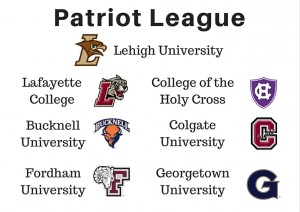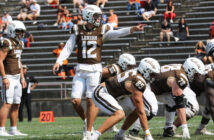There are many factors to consider in the preparation of the Patriot League football schedule.
Making sure there’s a balance of home and away games, avoiding the scheduling of a home game during a school’s fall break and meeting the desires of the alumni base are just a few of the parameters that colleges and universities must consider when scheduling games.
Some years, however, not all of these needs can be met.
In other sports in the Patriot League, schedules aren’t usually determined more than a year or so in advance. But in football, games are sometimes scheduled more than a decade in advance. According to Richard Wanninger, the senior associate executive director for external relations for the Patriot League and the man in charge of planning the league schedules for football, league games are scheduled out through 2027.
“We try to put together blocks of years for which schedules are done so that schools can schedule far enough out for their non-conference schedules,” he said.
Wanninger also said that non-league games have been scheduled out through the 2020s.
Both Joe Sterrett and Bruce McCutcheon, the directors of athletics at Lehigh and Lafayette College, respectively, discussed the different constraints they and the other athletic directors have when putting together football schedules. They both said they like to schedule games against Ivy League schools, as well as a couple games against opponents in the Colonial Athletic Association and Northeast Conference.
Sterrett said that the Patriot League used to have a formalized agreement to have a certain number of games each year with the Ivy League, but that agreement no longer exists.
“That helped a bit in that you have had a few more games that were locked in and fewer to try to arrange,” Sterrett said. “But that scheduling agreement expired 10-12 years ago, so we haven’t done that since then.”
McCutcheon had similar philosophies in terms of scheduling non-conference opponents. He said that it is fairly common for a schedule to be completely full for the next year before the previous season is even completed.
“Starting from scratch each year would be an extremely difficult task because everybody is scheduled out this far,” McCutcheon said.
Among the wide range of factors when building a football schedule, the players of the actual team cannot be forgotten. Senior defensive lineman Matt Laub said he enjoys playing different teams each year because it allows them to see different parts of the country. He said that traveling to James Madison University this year and to Liberty University his freshman year were among the best experiences he’s had going to other stadiums.
“If you play different teams around the country each year, you get to travel more and see more places,” he said. “A lot of guys look at that coming out of high school as a positive thing.”
Sterrett and Lehigh’s football coach Andy Coen both noted that proximity is a key factor in determining non-league games because it’s logistically easy and requires less travel. They said that they like to schedule games against schools such as University of Delaware and Villanova University.
“If we could dictate everything and decide who we would like to play, I’d rather play institutions that are more proximate,” Sterrett said. “It manages costs a little better.”
The idea of proximity also applies to universities within these conferences with which they have relationships such as the Ivy League and the Northeast Conference. For Lehigh, Sterrett said it makes more sense to schedule games against University of Pennsylvania and Princeton University as opposed to Dartmouth University or Brown University, which are in New Hampshire and Rhode Island, respectively.
By also remaining close by with non-conference games, it increases the likelihood that alumni will be able to attend the games. Sterrett said that this is definitely a factor he considers when determining out-of-league opponents. Additionally, if the away non-conference games are close enough to Lehigh, then the local fan base can attend the games more easily.
Coen said that he occasionally gets phone calls in the offseason from less proximate schools such as Montana State University and North Dakota State University looking to schedule games. These schools aren’t just far away though, they’re also very consistently top FCS teams. North Dakota State has won the FCS championship four years in a row.
Coen said that while games like these can be a great experience for the student athletes by exposing them to a different part of the country, they’re just not what they’re looking for.
“There’s no reason to go three quarters of the way across the country to play a team that’s better than you,” he said.
However, some players on the team may view this situation differently. Laub said he would fully endorse a trip out to the West Coast to play a game, regardless of that team’s skill level.
“I think something like that would be all about the experience…I think guys would absolutely embrace that and take that up full-heartedly,” Laub said. “That’s exciting to players, that’s cool.”
In general, the Patriot League has 10 full members, but only five of them are full members for football: Lehigh, Lafayette, Colgate University, Bucknell University and College of the Holy Cross. Navy and Army West Point are both FBS teams in football, and American University, Boston University and Loyola University (Maryland) don’t have football programs.
In addition to the five full members for football, Fordham University and Georgetown University are associate members of the Patriot League for football. However, this still only adds up to seven teams, making it one of the smallest football conferences in the nation.
FCS teams generally have 11-game schedules for football, and with only six league games each year, it requires them to schedule five non-league games each year as well. Sterrett and McCutcheon both agreed that this can be a difficult task.
They said that all the athletic directors and coaches in the league believe that adding another member to the league for football would make scheduling easier.
“We really would like to have a conference that’s eight, nine, maybe even 10 (teams),” Sterrett said. “That way you have a couple or three non-league games, which is great because you can do what you want in that regard, but the bulk of your schedule is going to be a league schedule, and most conferences are that way.”
He went on to say that having a smaller conference leads to less flexibility, which can lead to less than optimal situations of scheduling, such as a three-game road trip or a bunch of two-game road stretches.
One possible way to make scheduling more flexible is to include games on Friday nights. Lehigh had its season opener this season on a Friday, but Coen said this is rare. McCutcheon added that he tends to shy away from scheduling for Friday nights.
“I’m not a big proponent of playing on a Friday night, particularly Friday night at home,” he said. “Pennsylvania, and the Lehigh Valley in particular, is big high school football country, and we like to have that Friday night reserved for those teams.”
Georgetown is the most recent addition to the league for football when it was added as an associate member in 2001. Since then, there have been talks on a regular basis about adding another member to the league, but this has not yet come to fruition.
McCutcheon said that even though the league doesn’t make public announcements about a new addition, it’s still one of the important things on their agenda. Sterrett noted that adding another full member would be positive for football, but would affect all other sports since the league would expand there as well.
The Patriot League does things differently than many conferences, which means some schools may be hesitant to join, according to Sterrett. For example, the league doesn’t allow redshirting, which is when student athletes will intentionally sit out their freshman year in order to delay their eligibility. The league is also particular about its academic requirements for student athletes.
“I’d rather struggle with scheduling than end up with the wrong league configuration of schools,” Sterrett said. “But if the right schools align with us at some point in time, that would be great.”
Coen said that while there needs to be a compromise, he understands why there hasn’t been much progress in recent years.
“There’s always conversion of (expansion), and it always sounds like it’s moving in a positive direction,” he said. “But it’s hard for us all as league coaches to sit there and really feel like it’s going to happen just knowing all the things that other schools would be giving up.”






Comment policy
Comments posted to The Brown and White website are reviewed by a moderator before being approved. Incendiary speech or harassing language, including comments targeted at individuals, may be deemed unacceptable and not published. Spam and other soliciting will also be declined.
The Brown and White also reserves the right to not publish entirely anonymous comments.
1 Comment
Interesting article on scheduling. Would our software help with any other of your sports schedule? We can work something out that would help.